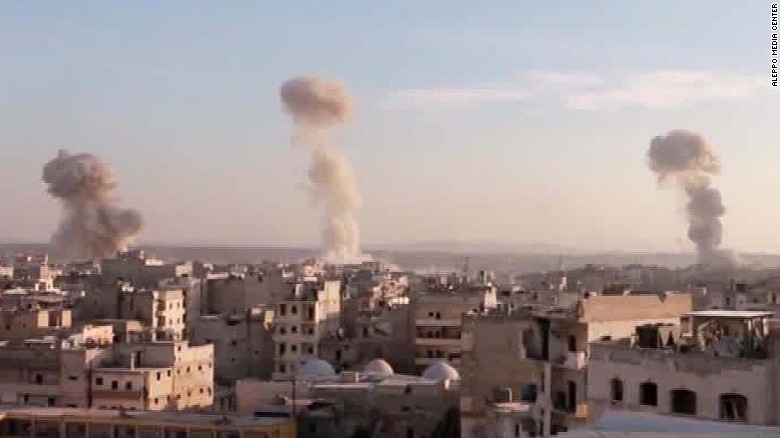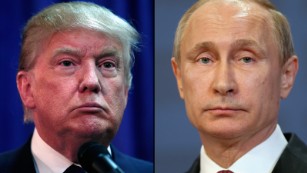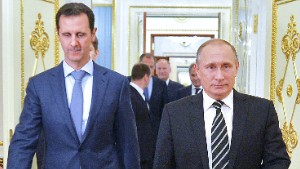Is Aleppo the first flash point in Trump and Putin's relationship?
The Admiral Kuznetsov is not in itself that impressive: the Russian aircraft carrier is said to heave black smoke as it travels. On Monday, one of its fighter jets crashed due to a technical failure while trying to land on it.
But the signal that the Russian flagship's arrival sent when it arrived on the Mediterranean Coast, not far from the ravaged city of Aleppo, was singular: Russia wanted to be seen to be upping its fight in Syria.

Russian flotilla deploys to Syrian coast
In the past few hours, despite Russian denials, bombs are falling: a steady stream -- some floating eerily down assisted by parachutes, say witnesses -- have hit Aleppo.
It isn't clear exactly how much military punch the Kuznetsov carries, or what it will do in the broadly imprecise bombing campaign and torturous ground war that is the fight for Aleppo, but the timing was unmistakable.
On Sunday, the residents of Aleppo got another haunting text message -- telling them to get out or die. The timing of this latest twist in the agonizing and inhumane fate of Aleppo may owe more to another incident across the Atlantic: the election of Donald Trump.
For the President-elect, the potential "zero-hour" announced against the rebel-held east of the city by Syrian state TV represents an almost binary moment of truth. Moscow may be using this moment -- during which the President-elect can only hint at future policy rather than change the relatively disengaged approach of the outgoing White House -- to test the new US administration's gut responses.

Which of two ways will Trump swing when he takes office on January 20?
First is the traditional Republican response to Russian foreign policy moves -- aggressive condemnation. Sen. John McCain -- reacting to the implied possible rapprochement between Moscow and Washington -- said on Tuesday: "at the very least the price of another 'reset' would be complicity in Putin and Assad's butchery of the Syrian people. That is an unacceptable price for a great nation." He said the US must stand against tyranny. Much of the Republican establishment agrees that while Trump appears at times to be trying to mend relations with Russia, they would feel more comfortable with this familiar tone.
Second is that aforementioned rapprochement. Trump sold his voters a possible mano-a-mano relationship with Putin that could improve relations and solve problems. The most ghastly and simplistic reading of that is that in Aleppo, Trump may quietly condone the impending bombing of the city and its estimated 200,000 trapped civilians as a move intended to bring a decisive military change to a five-year war of attrition for Syria's largest city. Under this possible scenario, Washington would accept that some rebels fighting in Aleppo have jihadist links, and that the purging of rebel elements from the city's East at least clarifies the map of regime-rebel borders, albeit at an unacceptable human cost.
This second approach comes at a cost for the White House of likely universal condemnation not only from their allies, but also from much of the US's own elite. Even VP-elect Mike Pence has called Putin a "small and bullying" leader.

US-Russia relations after election
Yet the coming 60 days present Moscow -- rarely so emboldened in its foreign adventures, or so in need of them to distract from domestic economic problems -- with a rare opportunity. The future leader of the free world who thus far has given virtually no signals to this point -- bar promises of excellence, friendship with Israel, and a rethink of the Iran nuclear deal -- of how he sees his major foreign policy challenges. Moscow knows what the practical response of the White House that is currently in power will be: the same as it has been over the past years. But they can test the rhetorical response of their new adversary or ally.
For the people of Aleppo, that could spell weeks of escalating horror.
News Courtesy: www.cnn.com











